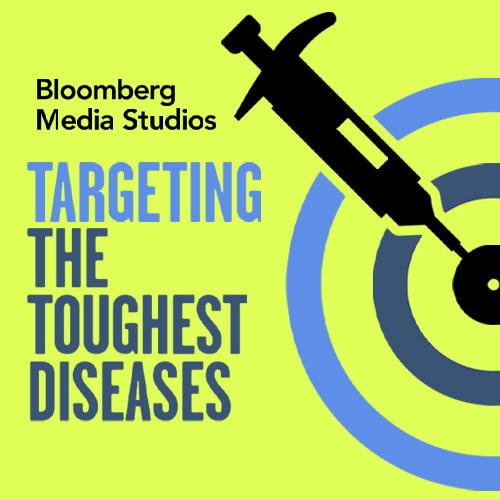Targeting the Toughest Diseases:
A podcast

Did you know that ancient Egyptians detected type 1 diabetes using ants? Or that there’s even a link between muscular dystrophy and autism? In “Targeting the Toughest Diseases” — a podcast created in partnership with Bloomberg Media Studios — we hear the stories of people living with these and other serious diseases, from experts all over the world who explain the often little-known histories of these conditions, and about how we are using innovative tools, methods and a unique philosophy to search for treatments and cures.
Listen to the available episodes below and subscribe today.

Jordan Gass-Pooré
About the host
Jordan Gass-Pooré (she/her/hers) is the host of “Targeting the Toughest Diseases” and is an award-winning podcast producer and investigative journalist with more than a decade of journalism experience. She is a member of the University of Southern California’s Center for Health Journalism and has produced CNN’s podcasts, “Chasing Life” and “Coronavirus: Fact vs Fiction,” both hosted by Dr. Sanjay Gupta.
Presently, Jordan is the creator, producer and host of “Hazard NJ,” a limited-series podcast about the impacts of climate change on hazardous Superfund sites in New Jersey. “Hazard NJ” is in collaboration with the PBS affiliate NJ Spotlight News. She is also the creator and co-host of the podcast “Hazard NYC,” a four-part limited series exploring how climate change affects the city’s Superfund sites from FAQ NYC. It’s produced by the nonprofit news outlet THE CITY.
Jordan has a master’s degree in investigative journalism from City, University of London and a bachelor's degree in journalism from Texas State University.
Series trailer

Introducing: “Targeting the Toughest Diseases”
“Targeting the Toughest Diseases” looks at some of humanity’s most challenging diseases and how we are using innovative tools, methods and a unique philosophy to search for treatments and cures. Produced in partnership with Bloomberg Media Studios — listen to our series trailer and subscribe today.
Cystic fibrosis

Targeting Cystic Fibrosis
NFL quarterback Boomer Esiason’s career high came just days before his son was diagnosed with cystic fibrosis — a genetic disease characterized by thick and sticky mucus that interferes with breathing, digestion and the body’s ability to fight infections. Esiason now dedicates his free time to raising awareness to help fund the search for a cure. We explore how our Chief Scientific Officer, Dr. David Altshuler, and our research team have spent the last 20+ years researching the underlying cause of the disease — and why our work is not yet finished.
Sickle cell disease

Targeting Sickle Cell Disease
Terri Booker’s body burns with pain. She’s one of 100,000 Americans living with sickle cell disease — a blood disorder that can cause severe pain, organ failure, and even premature death. The genetic condition came about to protect against malaria. Dr. William Hobbs leads clinical development for our sickle cell disease program, where we are investigating multiple approaches to try to address the unmet needs that patients face.
APOL1-mediated kidney disease

Targeting Genetic Kidney Disease
NBA great Alonzo Mourning returned home from the Sydney Olympics after winning the gold medal feeling ill. He surprisingly was diagnosed shortly after with kidney disease. Scientists have discovered his type of kidney disease is linked to having genetic variants of the APOL1 gene — ones that 13% of African Americans carry. Dr. Ogo Egbuna leads clinical development for our team that is researching APOL1-mediated kidney disease and investigating small molecule therapies to target its underlying cause. Alonzo Mourning is a paid spokesperson for Vertex Pharmaceuticals.
Type 1 diabetes

Targeting Type 1 Diabetes
Madison Carter is a fearless investigative reporter. She takes no day for granted because she lives with type 1 diabetes (T1D). Dr. Doug Melton is a world-renowned stem cell researcher and distinguished fellow here at Vertex — and his now grown children, Sam and Emma, live with T1D. Along with scientists like Dr. Felicia Pagliuca, who leads our research into T1D, he's been on a quest to help Madison, Sam, Emma and others like them by investigating the disease at a cellular level.
Pain

Targeting Pain
Damian Sanchez, Damian J to music fans, is a Miami-based jazz musician. A car accident landed him in the hospital with multiple fractures to his leg. Once there, he faced the difficult decision of whether or not to take the pain medication that was offered to him. With patients like Damian in mind, Dr. Paul Negulescu and our research team are thinking differently about pain — we’re investigating potential non-opioid based treatment options that aim to target pain differently.
Duchenne muscular dystrophy

Targeting Duchenne Muscular Dystrophy
John Killian’s son was diagnosed with Duchenne muscular dystrophy (DMD) as a toddler. Until recently, children with DMD were not expected to live beyond their teens. The disease weakens the body's muscles and cognitive functions, which can lead to premature death. John’s son is now college-bound, thanks to the help of medical advancements that target the symptoms of the disease. Geneticist Dr. Alison McVie-Wylie and our research team hope to move past only treating the symptoms of DMD by addressing the disease at its root cause.



